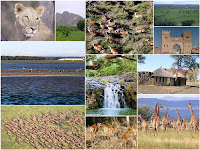Could It Be Africa's Greatest Danger?
 When some times back, at an African Union summit, Yoweri Museveni, the President of Uganda, declared that Climate Change is an act of aggression by the wealthier countries and that Africa should be compensated - most observers, then, simply ignored him. But, as it is now, and considering the recent predictions by the IPCC on how gravely Africa will be affected by Global Warming - Museveni had very good reasons to say what he did: Africa, the poorest continent and the least consumer, will suffer most due to Climate Change. Climate Change, which now, most scientists agree - has been in some ways, caused by the excesses and greed of the industrialised, rich world.
When some times back, at an African Union summit, Yoweri Museveni, the President of Uganda, declared that Climate Change is an act of aggression by the wealthier countries and that Africa should be compensated - most observers, then, simply ignored him. But, as it is now, and considering the recent predictions by the IPCC on how gravely Africa will be affected by Global Warming - Museveni had very good reasons to say what he did: Africa, the poorest continent and the least consumer, will suffer most due to Climate Change. Climate Change, which now, most scientists agree - has been in some ways, caused by the excesses and greed of the industrialised, rich world. Signs of a changing climate in Africa have already emerged: spreading disease and melting glaciers in the mountains, warming temperatures in drought-prone areas, and sea-level rise and coral bleaching along the coastlines. The panel of scientists, go as far as suggesting not only that water will become scarce, vegetative cover will recede, but, in some countries, crop yields may collapse. All these leading to more suffering for the millions in Africa, especially women and children; and leading too, to more hunger, diseases and deaths. With glaciers melting on mountains in Africa, lakes and vegetation drying - animal and wildlife habitat and biodiversity, will, too, be adversely affected across Africa.
Signs of a changing climate in Africa have already emerged: spreading disease and melting glaciers in the mountains, warming temperatures in drought-prone areas, and sea-level rise and coral bleaching along the coastlines. The panel of scientists, go as far as suggesting not only that water will become scarce, vegetative cover will recede, but, in some countries, crop yields may collapse. All these leading to more suffering for the millions in Africa, especially women and children; and leading too, to more hunger, diseases and deaths. With glaciers melting on mountains in Africa, lakes and vegetation drying - animal and wildlife habitat and biodiversity, will, too, be adversely affected across Africa.As for the rest of the World: food prices are set to rise around the globe after years of decline, with climate change making it harder for the world's poorest to get adequate food; this would destabilise many countries and create conflicts - within nations and between nations, all fighting for the reduced resources, due to Climate Change. And for the Planet's wildlife and animals: a study published in the scientific journal Conservation Biology finds that global warming represents one of the most pervasive threats to our planet’s biodiversity – in some areas rivaling and even surpassing deforestation as the main threat to biodiversity.
Is it all gloom and no hope? Well, Australia's new leader, immediately after winning the elections, has signed documents to ratify the Kyoto Protocol; that is great news. Hopefully, a better alternative to the Kyoto Protocol - which expires in 2012 - will be created. And Africa? Scientists say, Climate Change, will mean more rainfall in some parts of Africa - which, if not causing floods and devastation as they did to Uganda a few moths ago, will be good. But what Africa really and truly needs is: leaders with vision and integrity. Unfortunately and very sadly, few African leaders are concerned, or do really understand the challenge posed by Climate Change. Many African countries have, still, their wealth squandered and misused by corrupt, unscrupulous 'leaders'. Africa's heavy debt burden and conflicts in Sudan, Chad, the DRC, Somalia and Northern Uganda - aren't helping either; but only draining resources that could have been put to better and more constructive use.
Africa's own politicians and leaders should, and need to, show: practical, constructive leadership with foresight, in what could turn out to be Africa's greatest challenge and gravest danger since slavery: Climate Change. Hopefully, too, the ongoing negotiations in Bali, will come up with positive results and a way forward to save our planet from the devastating effects of Global Warming.
Map: axiosenergy


